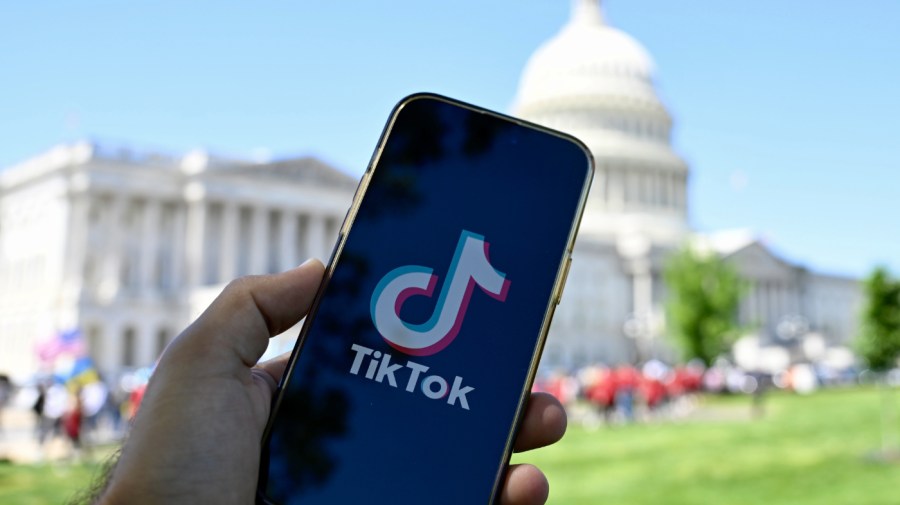
Economically, militarily and politically, China has emerged as the gravest national security threat facing the United States since the Cold War. Yet, our elected officials seem comfortable avoiding this threat with the same determination used to overcome the Soviet Union.
Due to the magnitude of the threat China poses, it was a relief to see the House finally pass military aid to Taiwan and advance a bill that may force the sale of TikTok to an American company or ban it outright. It is now absolutely imperative that the Senate waste no time sending these for President Biden’s signature.
Quite simply, China is the key foreign policy issue that Democrats must address right now, and while making sure Taiwan has what it needs to repel a potential Chinese invasion, the importance of robbing Beijing of TikTok, perhaps its most strategic intelligence-gathering asset, cannot be overlooked.
While there are valid arguments against banning TikTok, primarily that this ban would nullify America’s competitive edge in protecting intellectual property and freedom of speech, there are equally, if not more, valid arguments that the app should be banned.
To start, China has a well-deserved reputation for stealing the IP of American companies and forcing them to transfer proprietary technical knowledge. And while the U.S. should always strive to be better than our enemies, sometimes we must fight them on their level.
Further, China’s recent efforts to expand its spying on U.S. citizens with an intelligence base in Cuba, expand its influence into our neighborhood via Venezuela, threats to invade Taiwan, its continued support for Iranian and Russian military activities and Chinese influence campaigns designed to impact our elections make it clear that while not yet a hot war, the U.S. and China are locked in a cold war that very well may exceed the intensity of the first one.
Make no mistake, while each country within the China-Russia-Iran axis of evil poses a threat on its own, China is the heavyweight in this alliance. Beijing’s military strength dwarfs that of Russia and Iran, as does China’s economic and diplomatic heft, with an economy more than five times larger than Russia’s and Iran’s combined.
Biden’s recent announcement that he would raise tariffs on Chinese steel and aluminum imports is a step in the right direction, but more must be done. Otherwise, China will continue to be a thorn in his side, an issue Donald Trump will surely use to attack Biden during the presidential campaign.
Similarly, Biden’s enforcement of existing sanctions on these countries falls woefully short. Iranian oil exports recently hit five-year highs, with most of it flowing to China. In turn, China continues funding Iranian terrorism and Russia’s war against Ukraine.
Put another way, combatting the geopolitical threats posed by this alliance requires a whole-of-government approach, and marshaling the full power of the United States, something Biden and Democrats appear afraid to do.
A new poll conducted by my firm, Schoen Cooperman Research, underscores not only how great this threat is, but also reveals the deeply negative attitudes Americans harbor towards TikTok, the Chinese Communist Party and the alliance of evil seeking to undermine our democracy.
Nearly two-thirds (63 percent) of Americans believe the CCP has “a lot” or “some” control over TikTok, while a majority (52 percent) of Americans feel the app negatively impacts American society, per SCR’s poll.
Moreover, Americans have a broad range of reasons to not only oppose TikTok but also support the bill to ban it. More than 6 in 10 Americans are convinced to support the bill to ban TikTok due to China’s relationship with Iran and Russia (63 percent), the threat TikTok poses to our national security (61 percent), the divisive and harmful messages promoted on the app (61 percent), China’s use of Americans’ data (61 percent) and the national security threat (60 percent).
Positively, after weeks of partisan delay, the House of Representatives has sent a modified version of the TikTok bill, which last month passed overwhelmingly and in a bipartisan fashion, to the Senate.
To be sure, while it may seem trivial to put TikTok next to the very real geopolitical and military threats emanating from China, Russia and Iran, TikTok is one of the most commonly used apps in the country. With 170 million users in the U.S., its influence over Americans, particularly young Americans, cannot be overlooked.
It is also worth noting that TikTok is not the only tool Beijing is using to try and influence our elections and weaken our country. As I wrote in these pages just two weeks ago, China has been running a state-sanctioned effort on X to meddle in our democratic process. This includes a new tactic termed “MAGAflage” where Chinese bots impersonate Donald Trump supporters in an attempt to influence voters and sow divisions among Americans.
Ultimately, combatting the multitude of threats posed by China should be the central issue for all of our elected officials, and it starts by banning TikTok, thus robbing our enemies of the premiere tool used to target and manipulate our country.
Failing to advance the TikTok bill will send a loud message to Beijing, Moscow and Tehran that the U.S. is either uninterested or unwilling to stand up for ourselves, let alone allies who are also under attack by these revisionist regimes, and the role of the U.S. as the defender of democracy and global superpower is up for grabs.
Douglas E. Schoen is a political consultant who served as an advisor to President Clinton and the 2020 presidential campaign of Michael Bloomberg. His new book is “The End of Democracy? Russia and China on the Rise and America in Retreat.”
Copyright 2024 Nexstar Media Inc. All rights reserved. This material may not be published, broadcast, rewritten, or redistributed.














